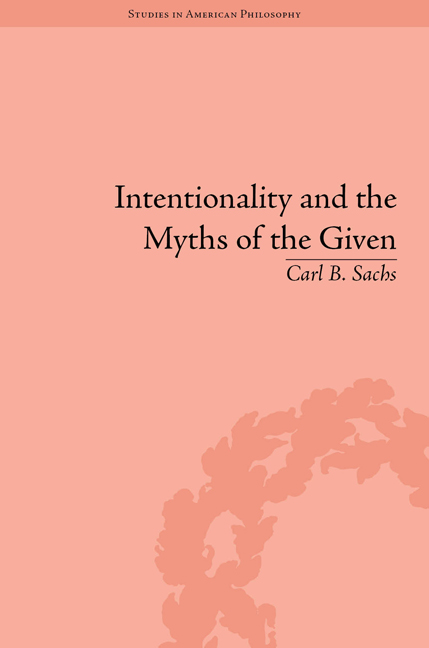Book contents
- Frontmatter
- Contents
- Acknowledgements
- Introduction: Why a New Account of Intentionality?
- 1 Intentionality and the Problem of Transcendental Friction
- 2 The Epistemic Given and the Semantic Given in C. I. Lewis
- 3 Discursive Intentionality and ‘Nonconceptual Content’ in Sellars
- 4 The Retreat from Nonconceptualism: Discourse and Experience in Brandom and McDowell
- 5 Somatic Intentionality and Habitual Normativity in Merleau-Ponty's Account of Lived Embodiment
- 6 The Possibilities and Problems of Bifurcated Intentionality
- Conclusion
- Appendix: Is Phenomenology Committed to the Myth of the Given?
- Works Cited
- Notes
- Index
3 - Discursive Intentionality and ‘Nonconceptual Content’ in Sellars
- Frontmatter
- Contents
- Acknowledgements
- Introduction: Why a New Account of Intentionality?
- 1 Intentionality and the Problem of Transcendental Friction
- 2 The Epistemic Given and the Semantic Given in C. I. Lewis
- 3 Discursive Intentionality and ‘Nonconceptual Content’ in Sellars
- 4 The Retreat from Nonconceptualism: Discourse and Experience in Brandom and McDowell
- 5 Somatic Intentionality and Habitual Normativity in Merleau-Ponty's Account of Lived Embodiment
- 6 The Possibilities and Problems of Bifurcated Intentionality
- Conclusion
- Appendix: Is Phenomenology Committed to the Myth of the Given?
- Works Cited
- Notes
- Index
Summary
In light of the worries raised in the last chapter about Lewis's tacit commitment to an ‘Augustinian’ picture of language, I aim to show here how Sellars's deeply Wittgensteinian understanding of linguistic practice both informs his criticisms of Lewis's commitment to sense-meanings and his non-Wittgensteinian account of episodes of nonconceptual consciousness as explanatory posits. Throughout, Sellars's conception of discursive intentionality is defended against Lewis's, and the implications are explored for how Sellars and Lewis differ on the pragmatic a priori. Of particular importance here are the precise grounds on which Sellars charges Lewis with the myth of the semantic given and why the Sellarsian alternative is desirable. Here I will develop the distinction between Lewis's conceptualistic pragmatism and Sellars's ‘transcendental naturalism’. As de Vries puts it, ‘It is a principle of Sellars's transcendental naturalism that transcendental structures must be reflected in causal structures, even if there is no reduction of the transcendental to the causal’. The contrast with Lewis will clarify just why Sellars is committed to ‘transcendental naturalism’, how the ‘must’ in de Vries's interpretation should be understood, and how we can distinguish ‘reflected in’ and ‘reduced to’.
Here I begin with a historical overview of the relation between Lewis and Sellars, with some discussion of the exchanges between Lewis and Sellars's father, Roy Wood Sellars, in order to better appreciate how transcendental naturalism functions as a via media between conceptualistic pragmatism (Lewis) and physical realism (RWS).
- Type
- Chapter
- Information
- Intentionality and Myths of the GivenBetween Pragmatism and Phenomenology, pp. 43 - 70Publisher: Pickering & ChattoFirst published in: 2014



